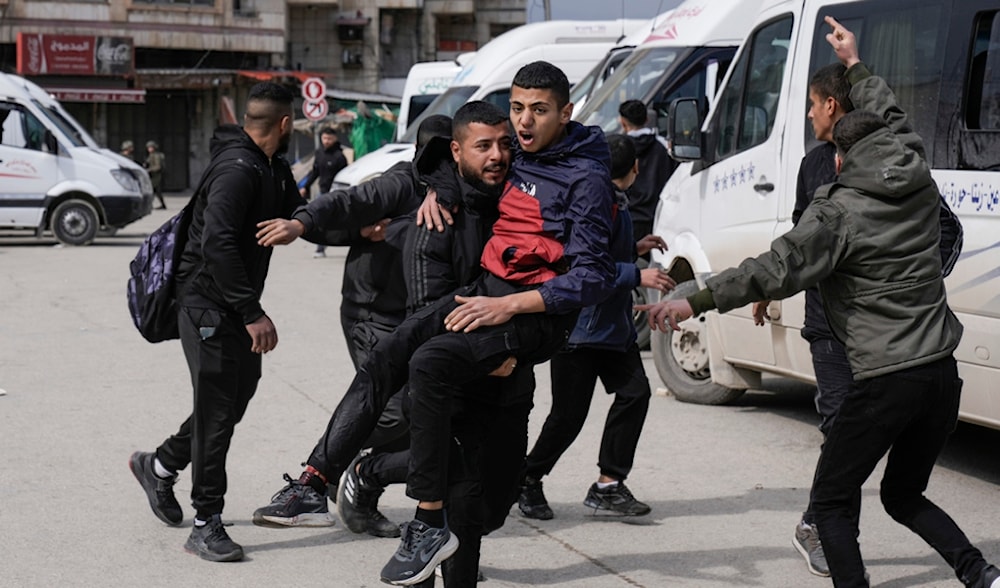West Bank sees largest expulsion of Palestinians since 1967: Report
A report by the New York Times shows that the Israeli war on the West Bank has resulted in the forced displacement of 40,000 Palestinians, the largest number since 1967.
-

People carry an injured Palestinian during confrontations with Israeli occupation forces in the West Bank city of Nablus, Sunday, Feb. 16, 2025 (AP)
Around 40,000 Palestinians have been forcibly displaced from their homes across the West Bank after the Israeli occupation forces (IOF) ignited the war against its towns and refugee camps, making it the highest recorded number since the occupation of the territories in 1967.
A report by the New York Times stated that tens of thousands of Palestinians were forced to seek refuge in wedding venues, relatives and friends' homes, schools, churches, mosques, and more, amid the Israeli aggression on the northern West Bank. As a result, concern has loomed over Palestinians, who now fear this is a bigger plot to permanently displace them from their homes.
While nearly 3,000 people have returned home, the majority remain homeless more than three weeks later—making this displacement larger than a similar Israeli campaign in the West Bank in 2002. According to two Palestinian experts and two Israeli historians specializing in West Bank history, 2002 saw Israeli forces storm multiple cities at the height of the Palestinian uprising.
As history repeats itself, thousands of those currently displaced will go back to their neighborhoods with no homes to return to, as the invading Israeli forces demolished dozens of buildings and houses, and destroyed roads, water pipes, and electricity lines.
The UN Office for the Coordination of Humanitarian Affairs reported that water and sanitation systems were destroyed in four densely populated refugee camps. It also noted that some water infrastructure had been contaminated with sewage.
Maha Nassar, a Palestinian-American historian at the University of Arizona, stated, "What makes this moment unprecedented is not only the scale of the displacement but also the accompanying discourse, which increasingly normalizes the idea of permanent forced displacement."
"This represents a significant escalation in the longstanding conflict, one that threatens to fundamentally alter the political and demographic landscape of the region," she added.
UNRWA chief sounds alarm on rising Israeli violence in the West Bank
At the Munich Security Conference on Saturday, UNRWA Commissioner-General Philippe Lazzarini sounded the alarm over "Israel's" ongoing assault on Palestinian refugees, which has forced over 40,000 Palestinians to flee their homes in the West Bank, alongside systematic efforts to dismantle the agency that serves millions of refugees.
Lazzarini stressed that UNRWA is under attack from multiple fronts: Israeli military aggression, political restrictions aimed at crippling its operations, and a disinformation campaign designed to delegitimize its work.
"The agency's financial situation is more precarious than ever," he stated. "We operate from hand to mouth, with no clarity about the future." He warned that if these efforts succeed, the suffering of Palestinian refugees will only deepen, while their right to return will remain non-negotiable.
Despite these challenges, UNRWA continues to provide life-saving assistance. In Gaza, the agency has delivered food aid to 1.5 million people, reopened health centers, and expanded healthcare services, providing 18,000 consultations daily. Meanwhile, in the West Bank, UNRWA schools educate 50,000 Palestinian children, and its health services remain operational despite Israeli military incursions.
But "Israel" continues to target UNRWA operations. Last week, Israeli forces stormed an UNRWA health center in Al-Arroub refugee camp near Beit Lahm, turning it into a temporary detention site during yet another violent raid. This attack is part of a broader strategy—since October 2023, Israeli forces have forcibly entered UNRWA facilities over 190 times, systematically undermining the agency's ability to function.
The escalation of violence in the West Bank has gone largely unreported, Lazzarini warned. The Israeli military has intensified its use of airstrikes, armored bulldozers, and forced displacements while Palestinian armed groups, in response, have deployed improvised explosive devices inside refugee camps. Refugees in the northern West Bank have faced particularly brutal crackdowns, with at least 40,000 people forcibly removed from their homes.
Read more: 'Israel’s' siege on Tulkarm: Arrests, raids, and destruction

 4 Min Read
4 Min Read










